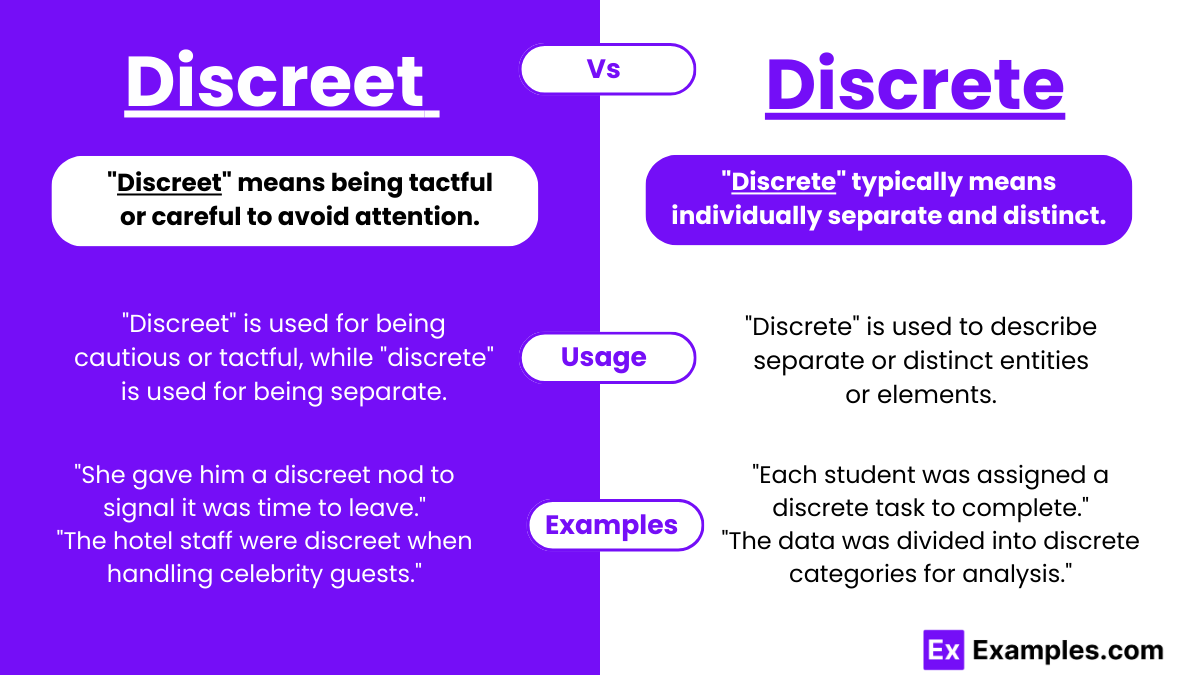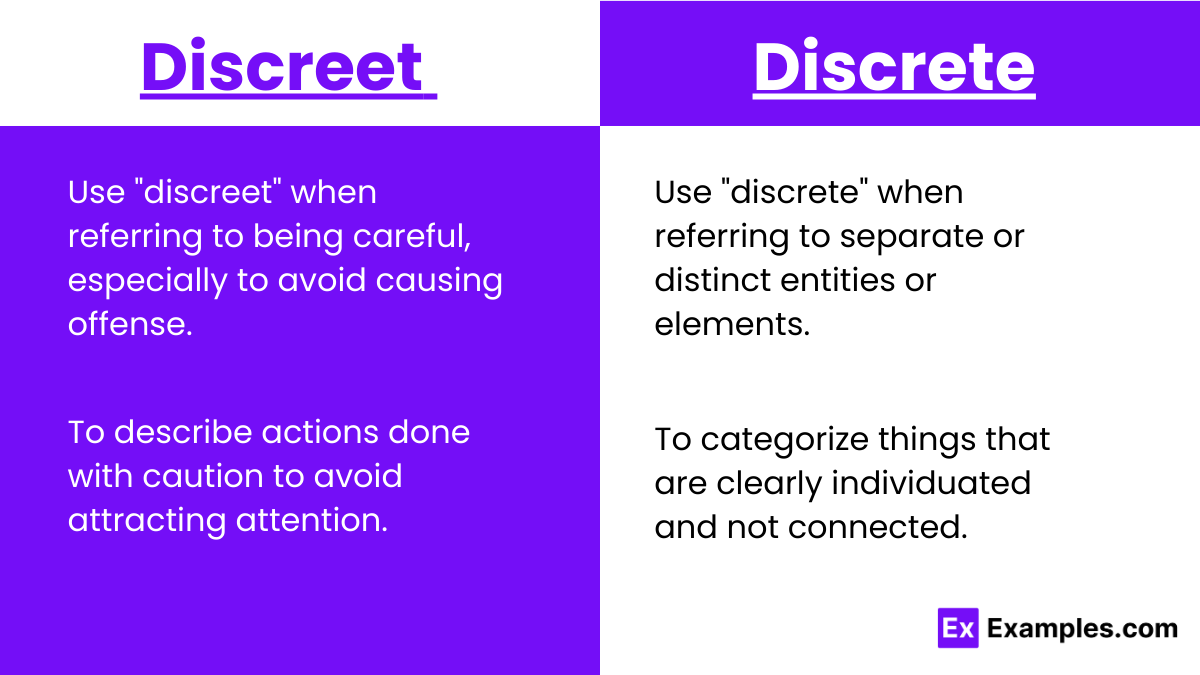Discreet vs Discrete – Meaning, Differences, Examples, Usage, Tips, PDF
The world of English vocabulary, we encounter the intriguing pair of homophones: “discrete” and “discreet.” Despite their identical pronunciation (/dɪˈskriːt/), these adjectives stem from the same Latin root “discretus” but have branched into distinct meanings, making their interchangeability a common pitfall. “Discrete” emphasizes separation and distinction, frequently adopted in mathematical and scientific discourse to contrast with “continuous” phenomena. It conveys the idea of individuality and independence among elements, underscoring the essence of separateness and clear boundaries in various contexts.
On the flip side, “discreet” embodies the art of subtlety and prudence, often describing the tactful, judicious, and unassuming nature of actions, behaviors, and individuals. It champions the virtue of being cautiously inconspicuous, highlighting a careful consideration for circumstances and sensitivities. The challenge homophones like “discreet” and “discrete” present is emblematic of the nuanced landscape of English vocabulary, where context is king. Recognizing the unique applications of these terms not only enriches one’s linguistic arsenal but also sharpens the precision of expression, a critical skill for students and language enthusiasts navigating the subtleties of communication.
Discreet and Discrete – Meanings
Discreet: “Discreet” describes the quality of being careful, prudent, and judicious in one’s conduct or speech, especially to avoid causing offense or to gain an advantage. It embodies the art of being circumspect in behavior, keeping sensitive matters confidential, and acting with restraint and caution. A discreet person values privacy and diplomacy, choosing their words and actions carefully to navigate social situations delicately. The essence of being discreet lies in the subtle, understated manner of handling affairs, ensuring that actions and communications are conducted with tact and discernment to maintain harmony and respect.
Discrete: “Discrete” refers to something distinctly separate and apart from others, often used in contexts where individuality and clear differentiation are emphasized. In mathematics and science, “discrete” contrasts with “continuous,” highlighting elements that are countable and distinct rather than forming an uninterrupted sequence or range. It encompasses the notion of separateness and division, where components can be identified as individual units without overlap. Discrete concepts are pivotal in various fields, providing a framework for understanding complex systems by breaking them down into simpler, independent parts, facilitating analysis and comprehension of their unique properties and functions.
Summary
“Discrete” and “discreet” are homophones with distinct definitions, despite their shared pronunciation and etymology. “Discrete” emphasizes the notion of being individual or separate, frequently applied in scientific or mathematical areas to denote elements that are distinct from one another, as opposed to forming a continuous whole. On the other hand, “discreet” embodies the quality of being subtle, prudent, or tactful, often relating to behavior that is intentionally low-key or considerate in order to avoid drawing attention or causing disruption.
How to Pronounce Discreet and Discrete
- Discreet: Pronunciation: /dɪˈskriːt/. The “discreet” is a word starts with a ‘d’ sound, followed by a short ‘i’ as in “sit,” leading into a ‘skr’ blend. The emphasis is on the second syllable, which has a long ‘ee’ sound as in “meet,” ending with a ‘t’ sound.
- Discrete: Pronunciation: /dɪˈskriːt/. Identical to “discreet” in sound, “discrete” begins with the ‘d’ sound, includes a short ‘i,’ follows with a ‘skr’ combination, and stresses the second syllable with a long ‘ee’ sound, concluding with a ‘t.’ Despite their different meanings, both words are pronounced the same way.
Difference Between Discreet and Discrete
“Discreet” and “Discrete” often cause confusion due to their identical pronunciation, yet they hold distinct meanings crucial for precise communication.
| Aspect | Discreet | Discrete |
|---|---|---|
| Meaning | Cautious, tactful, unobtrusive. | Separate, distinct, unconnected. |
| Usage | Describes behavior or actions. | Describes entities or elements. |
| Context | Social interactions, diplomacy. | Mathematics, statistics, analysis. |
| Nature | Qualitative, subjective. | Quantitative, objective. |
| Implication | Prudence, subtlety. | Individuality, separateness. |
| Synonyms | Prudent, tactful, circumspect. | Distinct, separate, individual. |
| Antonyms | Indiscreet, conspicuous. | Connected, continuous. |
| Etymology | From Latin discretus, meaning “separate” or “to discern.” | Same Latin origin, but with a focus on separation. |
| Examples | A discreet inquiry, a discreet gesture. | Discrete variables, discrete components. |
| Phrase Examples | “He was discreet in his dealings.” | “The data set contains discrete values.” |
Examples of Discreet and Discrete
Understanding the difference between “discreet” and “discrete” is key to their proper use. Here are examples to illustrate the distinct applications of each word:
Examples of Discreet:
- She made a discreet inquiry about the surprise party plans.
- His discreet nod conveyed his agreement without drawing attention.
- The detective followed the suspect at a discreet distance.
- They shared a discreet handshake, unnoticed by others.
- The document was kept in a discreet location for confidentiality.
Examples of Discrete:
- The survey categorized responses into discrete age groups.
- In mathematics, discrete variables can only take specific values.
- The project was divided into discrete phases for better management.
- Each discrete component of the machine serves a unique function.
- The study focused on discrete events in historical periods.
When to Use Discreet and Discrete
Navigating the nuanced distinction between “discreet” and “discrete” enhances clarity and precision in communication. Here’s when to use each term:
Usage of “Discreet”:
- To describe actions done with caution to avoid attracting attention.
- When referring to someone who is tactful and prudent in their behavior.
- For matters requiring confidentiality or subtlety.
Usage of “Discrete”:
- When talking about items or elements that are separate and distinct from each other.
- In mathematical or scientific contexts to describe non-continuous variables.
- To categorize things that are clearly individuated and not connected.
How to Use Discreet and Discrete
How to Use “Discreet”:
- In Describing Behavior: Use “discreet” when referring to actions that are carried out quietly or secretly to avoid attracting attention. For example, “She gave him a discreet signal to leave the room.”
- For Confidential Matters: Apply “discreet” in contexts where privacy and confidentiality are paramount. For instance, “The lawyer was very discreet with his client’s information.”
- In Diplomatic Situations: Use “discreet” when describing diplomacy or tactfulness in sensitive situations. Example: “His discreet handling of the negotiation won him many admirers.”
How to Use “Discrete”:
- In Scientific Contexts: Use “discrete” to describe elements that are separate and distinct, especially in mathematics or science. For example, “Discrete mathematics focuses on distinct values rather than continuous functions.”
- When Categorizing: Apply “discrete” to indicate clear differentiation among categories or groups. For instance, “The questionnaire offered discrete options for age groups.”
- To Highlight Individuality: Use “discrete” when emphasizing the separateness or individuality of components. Example: “The system is composed of several discrete parts that function independently.”
Tips for Discreet and Discrete
Mastering “discreet” and “discrete” can elevate your linguistic precision. Here are tips to distinguish and use these homophones correctly:
- Associate “discreet” with “tact”: Remember, a “discreet” person is tactful.
- Link “discrete” with “separate”: “Discrete” items are always separate entities.
- Remember the “E’s”: In “discrete,” the E’s are separated, just like discrete elements.
- Think “E” for “Eyes”: “Discreet” actions are done away from prying eyes.
- Use mnemonic devices: “Discreet” behavior keeps the “E’s” close together, away from notice.
- Visualize “discrete” items: Picture discrete items as individual, standalone pieces.
- Practice with sentences: Write your own sentences using “discreet” and “discrete” to reinforce their meanings.
- Context clues: Use context to determine if the situation calls for tactfulness (“discreet”) or distinctness (“discrete”).
Synonyms for Discreet and Discrete
Here’s a table of synonyms for “Discreet” and “Discrete” to help clarify their distinct meanings:
| Discreet (Adjective) | Discrete (Adjective) |
|---|---|
| Prudent | Separate |
| Tactful | Distinct |
| Reserved | Individual |
| Cautious | Independent |
| Circumspect | Unconnected |
| Unobtrusive | Isolated |
| Judicious | Disjointed |
| Subtle | Divided |
| Diplomatic | Detached |
| Modest | Singular |
Exercise
Fill in the blank with the correct form of “Discreet and Discrete”:
Here are ten sentences for an exercise to practice using “discreet” and “discrete”:
- The diplomat’s _______ manner helped in negotiating peace.
- Mathematics often deals with _______ quantities rather than continuous ones.
- She made a _______ exit from the party without anyone noticing.
- The data was categorized into _______ groups for analysis.
- He appreciated her _______ advice on personal matters.
- The complex system was broken down into _______ components.
- Her _______ choice of words avoided offending the guests.
- The survey results were divided by _______ age ranges.
- The agent’s _______ investigation led to uncovering the truth.
- In programming, _______ variables have distinct and separate values.
FAQs
Are Discreet and Discrete the Same?
No, “discreet” and “discrete” are not the same. “Discreet” means cautious or restrained, while “discrete” refers to something distinct or separate. Despite sounding identical, their meanings and applications differ significantly.
How Do You Know If It’s Discrete?
You know it’s “discrete” if it refers to individual, separate entities or non-continuous quantities. In mathematics and statistics, “discrete” is used for countable items or data that have distinct values.
Is Age Discrete or Continuous?
Age is typically considered continuous because it can include fractions and isn’t limited to whole numbers. However, when recorded in whole years, it’s often treated as discrete for practical purposes in surveys and research.
How Important Is Discrete?
“Discrete” is crucial in various fields, especially in mathematics and computing, where understanding and working with distinct, separate entities allow for precise calculations, data analysis, and algorithm development. Its importance lies in its ability to categorize and quantify individual units within larger systems.





